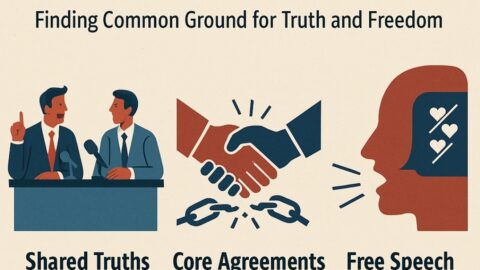Carl Jung: “To be normal is the ideal aim for the unsuccessful.”
Understanding the Quote:
Carl Jung’s observation points to the idea that seeking to be “normal” often represents a failure to strive for self-actualization and spiritual growth. Normalcy, in this sense, is not about living a balanced life but about settling for mediocrity and avoiding the discomfort of confronting one’s true self.
- ‘Normal’ as a Safe Haven: Many people equate normalcy with safety and predictability.
- Lack of Growth: By conforming strictly to societal norms, individuals may stunt their emotional, intellectual, and spiritual growth.
- Individuation vs. Conformity: Jung emphasizes the process of individuation, where a person integrates their conscious and unconscious selves to achieve true inner harmony.
Spiritual Insight:
In a spiritual sense, God calls individuals to a higher purpose beyond societal norms. Faith often challenges the conventional definitions of success, normalcy, and fulfillment.
Key Takeaway: Striving to be merely “normal” can limit one’s potential, keeping them trapped in societal molds instead of pursuing their unique spiritual and personal calling.
Albert Camus: “Nobody realizes that some people expend tremendous energy merely to be normal.”
Understanding the Quote:
Albert Camus highlights the emotional labor and psychological toll that comes with trying to fit societal definitions of normalcy. For many, appearing “normal” is an exhausting performance rather than an authentic state of being.
- The Hidden Struggle: People may sacrifice their true selves to align with societal expectations.
- Fear of Judgment: The energy spent maintaining appearances often stems from fear of rejection or ridicule.
- The Absurd Struggle: In Camus’ existential view, life lacks inherent meaning, and the pursuit of normalcy is one way people attempt to impose order on chaos.
Spiritual Insight:
Spiritually, this struggle can be seen as an attempt to find belonging and acceptance in human society rather than seeking identity and worth in God. True freedom comes from aligning with spiritual truth, not societal approval.
Key Takeaway: The exhausting pursuit of appearing “normal” can drain emotional and spiritual energy, preventing people from living authentically and purposefully.
What is ‘Normal’?
Definition of Normalcy:
- Societal Normalcy: Adhering to behaviors, values, and expectations widely accepted within a specific culture or community.
- Psychological Normalcy: Emotional stability, healthy relationships, and functional day-to-day living.
- Spiritual Normalcy: Living in alignment with divine principles, humility, and moral integrity.
Normalcy in a Healthy Society (God, Faith & Biblical Values)
God-Centered Purpose: Society emphasizes living according to God’s commandments, faith, and moral integrity.
Value of Relationships: Relationships are built on love, respect, and selflessness rather than personal gain.
Community Support: Society prioritizes helping the vulnerable, promoting unity, and spiritual accountability.
Identity in God: Personal worth comes from being created in God’s image, not from material success or societal approval.
Balanced Living: Success isn’t measured solely by wealth, status, or productivity but by spiritual growth, love, and contribution to others.
Emotional and Spiritual Health: Emotional well-being is pursued through faith, prayer, and reliance on God’s wisdom.
Example: In a healthy, faith-centered society, a person facing failure would turn to God for strength and guidance rather than falling into despair or societal shame.
Normalcy in an Unhealthy Society (Materialistic, Idol, Atheist & Humanistic Values)
Materialism Over Spirituality: Success is defined by wealth, possessions, and power rather than moral integrity.
Self-Centered Living: The focus shifts from community well-being to individual gratification and ambition.
Idolatry of Status and Fame: Celebrities, wealth, and power become the idols of modern society.
Lack of Moral Boundaries: Ethics become subjective, often changing to suit personal desires.
Emotional Isolation: Relationships become transactional, and genuine emotional connections diminish.
Purpose Without God: Without a higher purpose, people often turn to hedonism, addictions, or nihilism to fill the void.
Example: In an unhealthy society, someone feeling purposeless might chase success, wealth, or external validation while ignoring their spiritual and emotional well-being.
The Role of Faith in Normalcy
In a Healthy Society:
- Faith acts as the foundation for moral and emotional stability.
- Normalcy is rooted in truth, humility, and reliance on God.
- Individuals are encouraged to grow spiritually, emotionally, and relationally.
In an Unhealthy Society:
- Faith is often replaced by self-worship, materialism, or secular ideologies.
- Normalcy becomes synonymous with superficial success and external validation.
- People are left feeling empty, anxious, and disconnected, despite appearing “normal” on the surface.
Navigating Normalcy in Today’s World
For Individuals:
- Self-Awareness: Reflect on whether your pursuit of “normal” aligns with your faith and personal values.
- Spiritual Grounding: Build your identity on God’s truth rather than societal expectations.
- Prioritize Authenticity: Be true to your beliefs and moral compass, even if it means standing apart from the crowd.
For Families:
- Faith as a Foundation: Build family life on prayer, faith, and Biblical principles.
- Open Communication: Discuss societal pressures and reinforce spiritual and moral priorities.
- Teach Discernment: Help children understand the difference between worldly success and godly fulfillment.
Final Reflection
- Carl Jung: Over-reliance on societal normalcy prevents people from realizing their true potential and individuality.
- Albert Camus: The pursuit of appearing “normal” can be an exhausting, energy-draining facade.
- Healthy vs. Unhealthy Normalcy: A God-centered society encourages purpose, community, and emotional well-being, while a materialistic society fosters selfishness, anxiety, and emotional emptiness.
Key Takeaway:
True “normalcy” isn’t about conforming to societal molds but about living with authenticity, integrity, and alignment with God’s purpose. Instead of chasing acceptance in an ever-changing world, anchor yourself in unchanging divine principles.







